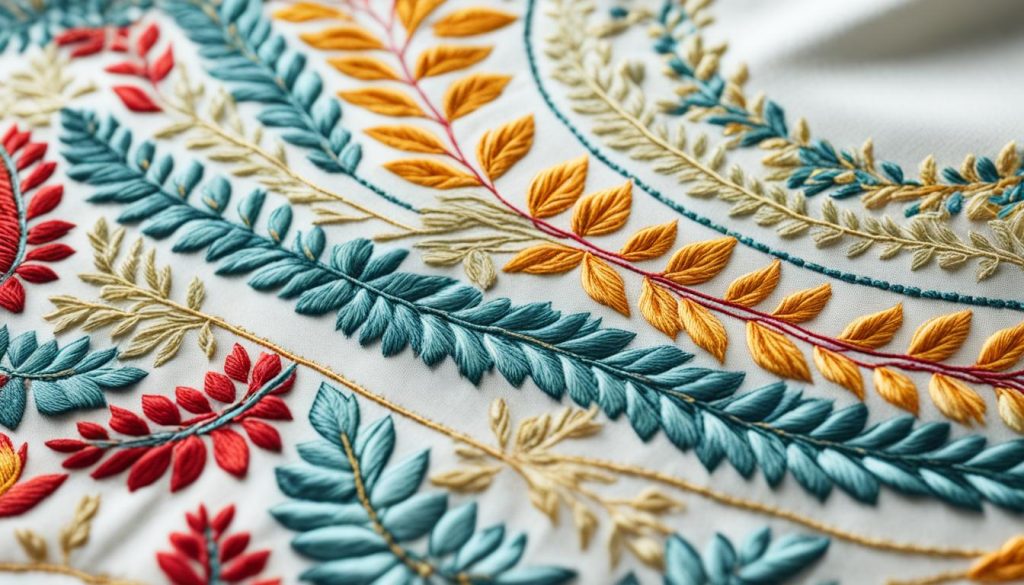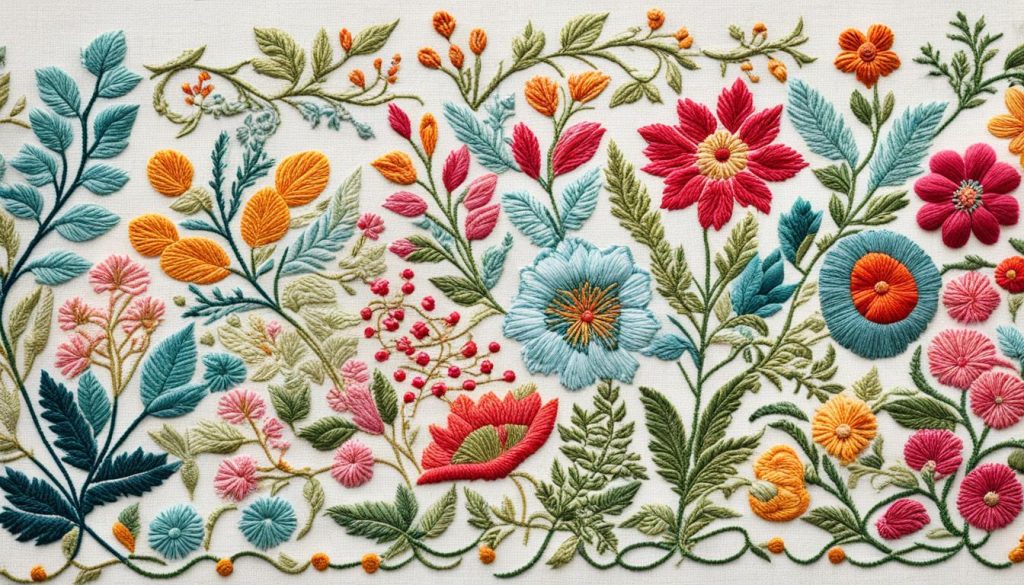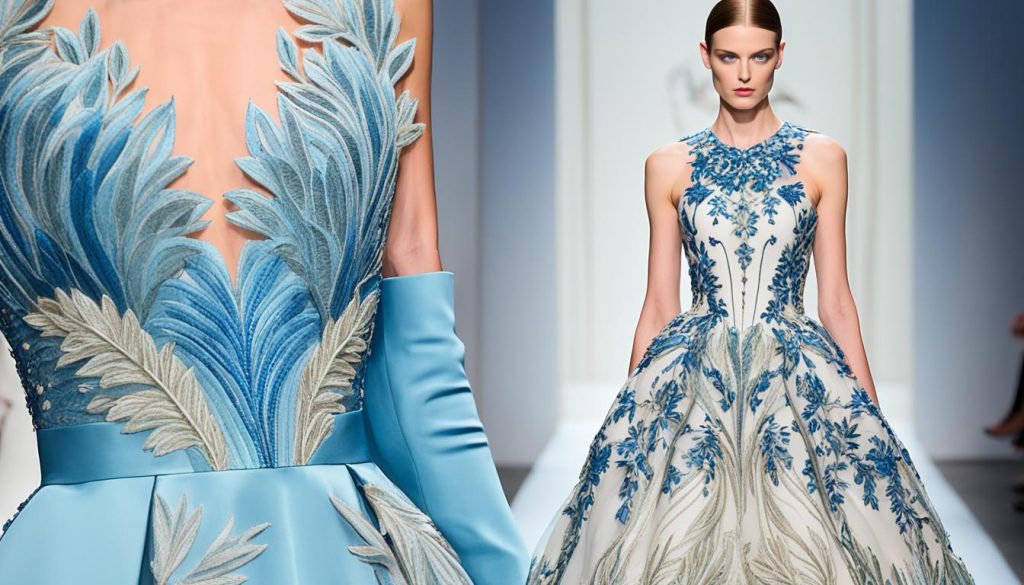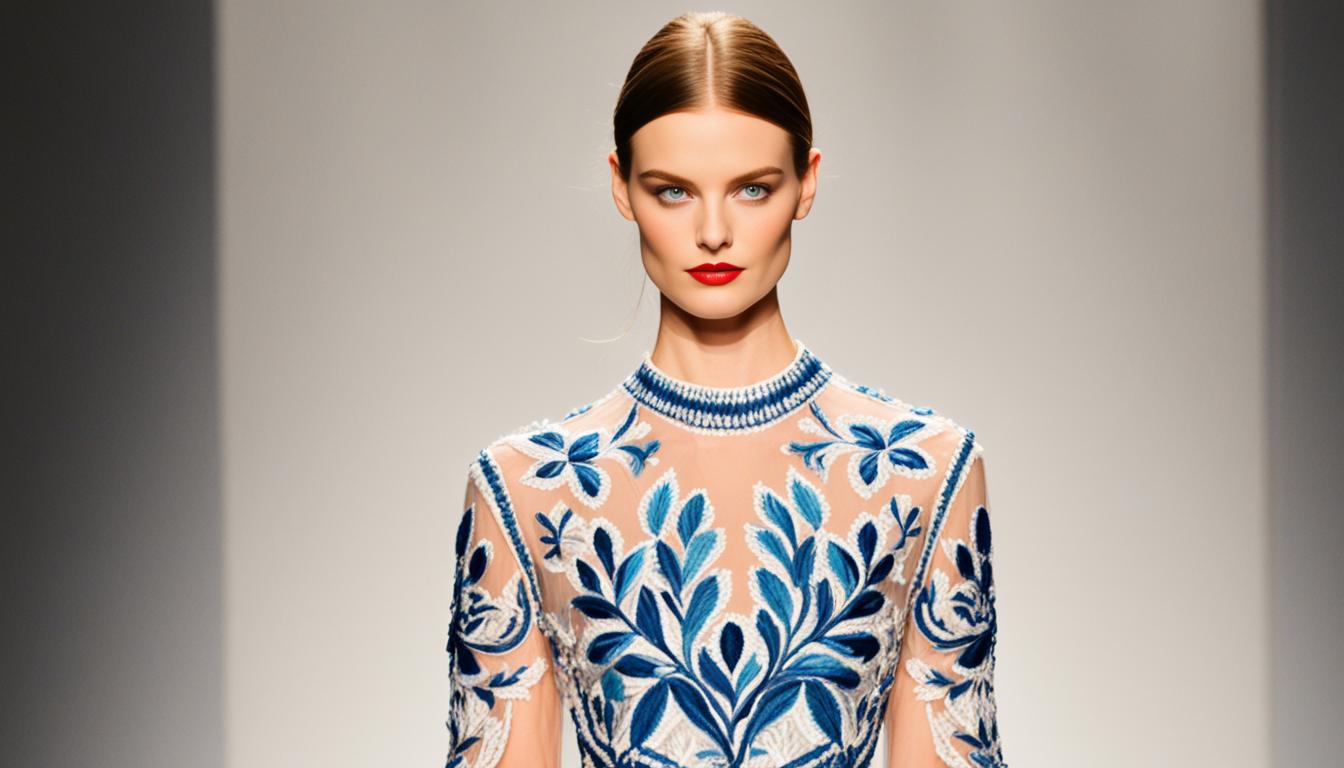Have you ever stopped to think why embroidery remains a key technique in fashion? It dates back thousands of years. Yet, it’s more than just a pretty detail. Embroidery gives clothes a unique, professional look. Big names like Lacoste and Lyle and Scott use it to make their logos stand out. This connects their brands with quality and fine work.
Embroidery isn’t just about looks. It’s also very practical. Unlike prints that fade or peel, embroidery stays intact. This keeps clothes looking good for a long time. It’s seen on both casual and fancy wear. This shows how crucial it is in fashion today.
Key Takeaways
- Embroidery enhances garments with a distinctive and professional look.
- High-quality embroidery signifies luxury and craftsmanship, as seen with brands like Lacoste and Lyle and Scott.
- Embroidery offers durability, maintaining its appearance over time compared to printed designs.
- Embroidery embodies both aesthetic and practical value in the fashion industry.
- Embroidered garments are synonymous with elegance and long-lasting sophistication.
The Professional Touch of Embroidery in Fashion
Embroidery adds a special touch to clothes that other ways can’t. It mixes art and accuracy to make each piece amazing. This makes many fashion brands choose it. Learning about its value can help you use it for many different fashion projects.

Quality and Durability
Embroidery stands out for its top quality and lasting power. It’s strong enough to handle daily use without losing its beauty. With custom embroidery, you get to pick from several thread types. These include rayon, metallic, glitter, and matte. Each thread color matches a Pantone/PMS color. This makes following brand colors simple.
| Thread Options | Characteristics |
|---|---|
| Rayon | Vibrant, high sheen |
| Metallic | Shiny, eye-catching |
| Glitter | Unique touch, brittle |
| Matte | Natural look, durable |
Compared to methods like screen printing, embroidery threads and dyes last longer and don’t lose color. This makes it perfect for clothes and items that you want to wear a logo forever.
Brand Promotion
Using embroidery for your brand is smart. It makes uniforms and corporate clothes look sharp. This helps your brand’s image stay in people’s minds. The professional finish of good embroidery leaves a great impression, making businesses stand out.
Today’s embroidery machines can quickly copy detailed designs. This means every piece looks the same. For teams or giveaways, embroidery shows your brand cares about quality.
Luxe Appeal
Embroidery brings a luxury feel to clothes and more. It’s loved by top fashion houses and those who look for quality. Different stitches like satin stitch, cross-stitch, and chain stitch allow for lots of design choices. This makes every embroidery unique and special.
From jackets to linens, embroidery makes everything fancier. Its strong work lasts a long time, keeping things looking good. This mix of style and strength makes embroidery stand out.
Evolution of Embroidery in the Fashion Industry
Embroidery goes way back to the Cro-Magnon era, about 30,000 BC. It shows how important it has always been in fashion. Through time, cultures around the world came up with their own special embroidery styles. These unique styles showed their art and cultural backgrounds.

Historical Significance
Thread embroidery in China dates back to 3500 BC. In Europe, embroidered clothes from 300 to 700 AD were first discovered. During the 1500s, embroidery became fancier in Europe. This made it a big symbol of wealth and status.
In the 19th century, St. Gallen, Switzerland, stood out with bead embroidery. This showed how embroidery styles varied by region. What’s interesting is that the first hand-embroidery machine was made in 1832 by Josué Heilmann. This invention made it easier for everyone to have fancy embroidery designs.
Modern Reinterpretations
Taking inspiration from the past, modern designers update and use old embroidery designs in new ways. Some, like Nataya, mix old styles, like those from the Victorian era, with new ones. Today, there are advanced embroidery machines that make the process faster and more precise. This is used not only in high fashion but also in business clothing for logos and designs.
Embroidery Techniques: Hand vs. Machine
| Aspect | Hand Embroidery | Machine Embroidery |
|---|---|---|
| Artistry | Hand embroidery is very personal and unique. | But machine embroidery offers consistency, good for making many at once. |
| Time and Effort | Hand embroidery takes a lot of time and skill, adding luxury to fashion. | Machine embroidery is faster and very common in making business clothes special. |
| Cost | It’s usually more expensive because it’s made by hand. | But machine embroidery is more affordable for big orders. |
Both hand and machine embroidery have their own charm. Handwork is loved for its personal touch and luxury feel. On the other hand, machine work is known for its efficiency and uniformity. Designers often use a mix of both to get interesting looks. No matter the method, embroidery still wows people in the fashion world.
Embroidery as an Art Form
Embroidery stands out as a unique art form, enhancing any piece of clothing. The term “embroidery” finds its roots in the French word broderie, which means “embellishment.” It dates back to about 30,000 B.C., proving its importance across many cultures over time. This craft is much more than just pretty designs; it tells stories and reflects social values.
Unique and Eye-catching Designs
Embellishing with intricate patterns, embroidery is truly exceptional. Artisans can create a wide array of designs, from simple to complex. These patterns come to life through both ancient and new techniques. Nneka Jones and Sheena Liam-Zacharevic are just a couple of the artists who have spread the beauty of embroidery on social media, making it more relevant today.
Range of Materials and Threads
Embroidery enthusiasts have a vast selection of materials to choose from. They can use everything from common cotton floss to luxurious gold and silver threads. Adding sequins and gemstones makes these creations versatile for all types of clothing.
Impact on Fashion Runways
Embroidery has left its mark on the world of fashion, especially on runways. Renowned brands like Gucci and Kenzo often showcase embroidered pieces. This choice blends the beauty of traditional crafts with contemporary style. It proves that embroidery is more than a technique; it’s a dynamic art form shaping fashion trends.
| Embroidery Type | Characteristics | Examples |
|---|---|---|
| Hand Embroidery | Detailed, labor-intensive, unique designs | Victoria Villasana, Sophia Narrett |
| Machine Embroidery | Precision, speed, mass production | Gucci, Kenzo |
Applications of Embroidery in Fashion
Embroidery has been constantly used in fashion for centuries. It has changed with different cultures and times. Today, it’s seen in everyday clothes, designer fashion, and work attire.
Embellishments on Everyday Wear
Embroidered details make daily clothes more elegant and unique. Whether it’s on jeans or t-shirts, this art adds flair to normal outfits. Enthusiasts can now easily stitch their own designs onto clothes. They use kits that include everything needed to start crafting.
High-End Couture Designs
In luxury fashion, embroidery stands for top-level craftsmanship. It uses the finest materials like silk, beads, and lace. These high-quality materials are adorned with intricate embroidery. This process often takes a long time, adding to the exclusivity of top fashion brands. Traditional Chinese embroidery, known for its detailed work, is used by many global designers. They use it to create one-of-a-kind clothes.

Logos and Corporate Apparel
In the business world, embroidery is key for branding. Logos on corporate clothing make brands more visible and professional. This type of work is usually done with machines. It ensures all branding is uniform and well-made. Embroidery is used on various items, from hankies to office furniture covers. It’s a versatile tool for showing off a business’s image.
| Application | Description | Examples |
|---|---|---|
| Everyday Wear | Enhances casual clothing with personalized designs | Jeans, T-shirts, Jackets |
| High-End Couture | Uses luxurious materials and intricate patterns | Gowns, Dresses, Custom Attire |
| Corporate Apparel | Features corporate logos to promote brand identity | Uniforms, Office Wear, Promotional Items |
Conclusion
Embroidery’s role in fashion is deeply connected to history. It continues to grow today in new designs. For example, the #handembroidery hashtag on Instagram has become very popular. This shows more and more people are interested in this ancient art. The Financial Times also noted this trend, highlighting the appeal of both traditional techniques and modern styles.
Embroidery helps connect creativity with practical use. It offers different styles like Crewel, Whitework, and Blackwork, appealing to a wide range of tastes. Anyone from DIY fans to top designers can enjoy embroidery. It not only lets people be creative but also helps reduce stress. This shows the positive impact of the craft on our mental well-being.
The beauty of hand embroidery is that it doesn’t cost much and it’s good for the environment. Anyone with materials can try it. It’s also a form of branding. For instance, embroidered logos give products a professional look. They last longer and help brands get noticed more. So, embroidery is both a traditional art and a modern tool. It will always be key in the world of fashion.
